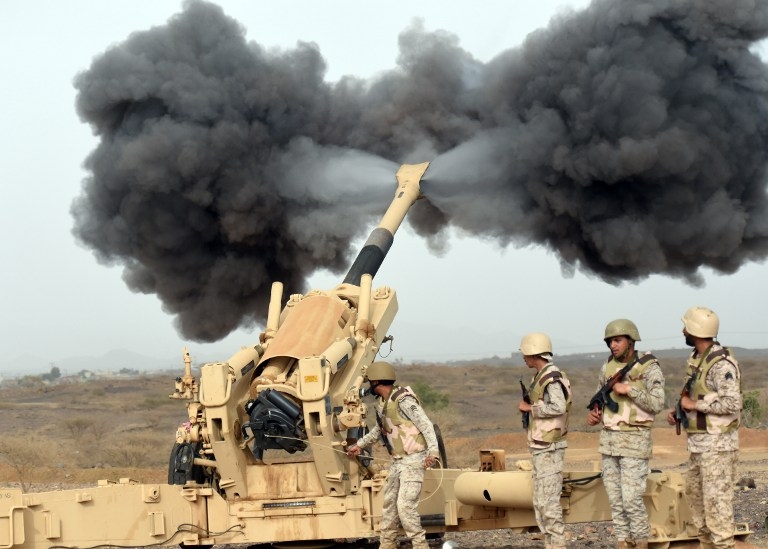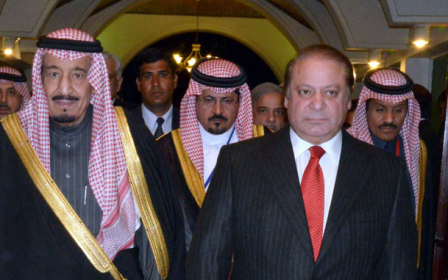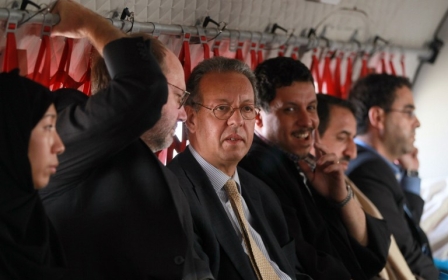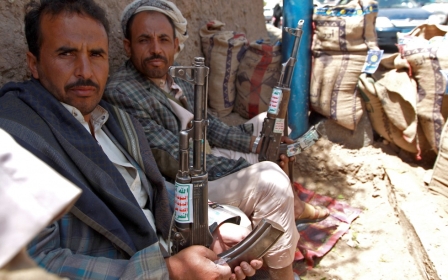The stakes are high in Yemen

Saudi Arabia faces a critical juncture in its air campaign against the Houthis in Yemen. There have been gains. The Houthis have been pushed back in Marib by tribal forces in the north and from areas of central Aden in the south. Their coalition with army units loyal to the ousted autocrat Ali Abdullah Saleh and his son Ahmed is also showing sign of wear and tear.
In an attempt to forestall a UN Security Council resolution which placed an arms embargo, among others, on Ahmed Ali Saleh, the former head of the Republican Guard, Saleh senior called for a ceasefire, denying any ambition either he or his family had to return to power. This was a rare display of softness from someone who had so actively undermined the presidency of Abd Rabbuh Mansour Hadi, his former deputy. Or it was realism?
That said, three weeks in, none of the main political goals of the air campaign have been accomplished - yet. The Houthis have not left the cities they have captured; Hadi has not been re-installed as president in Sanaa and a national dialogue on finding a government of national unity has yet to start. Militarily, the Saudis have yet to find a national figure to lead the fight back on the ground in Yemen, let alone unify the forces fighting the Houthis under one command.
Attempts to secure a ceasefire have so far foundered on the demand for a Houthi withdrawal from the main cities they have captured. The Turkish President Recep Tayyip Erdoğan failed to convince his Iranian counterpart Hassan Rouhani, in his latest visit, of the need for a Houthi withdrawal from Sanaa and Aden before a ceasefire is declared. The Iranians insist on a ceasefire based on the militias in their current position. The haggling is not over and the search for a ceasefire under the auspices of the UN is still ongoing. The fact that Russia did not veto the UN resolution could be significant.
The current impasse leaves the Saudis with two options: either fight the Houthis with local forces or assemble a foreign fighting force and go in through Aden. Both options pose big challenges.
Support for the tribal forces would necessarily entail arming Islah, which is a combination of Yemeni clans and the Muslim Brotherhood. The royal household is cautious about this, because it would amount to U-turn in policy, which was to fight the Brotherhood in every Arab country where it emerged as a major political force.
This was why the leading faction of advisers in the court of King Abdullah first opened secret contacts with the Houthis, although this is now emerging as more of an Emirati-run conspiracy rather than a Saudi one. A senior political representative of Islah recently visited Riyadh, so the Saudi taboo on direct contacts with a Brotherhood-affiliated group has been breached. But it would require more than this to install an Islah-backed government in Sanaa and it is an open question whether Riyadh wants this.
Saudi Arabia is committed to re-install Hadi in Sanaa, and start a national dialogue on forming a unity government. But the president in exile has not emerged from this episode with his credentials as a national leader enhanced. Anything but. He is seen by Yemenis as a weak wartime leader, who dithered under pressure and ultimately fled. Hadi is no Winston Churchill. This week, he was forced to make his prime minister Khaled Bahah, his vice-president. Bahah is seen as having stronger cross-party links than Hadi. Bahah's appointment as vice president is a sign of Saudi's recognition of Hadi's political weakness in Yemen.
The leader of choice, the man with the qualities to fight a war, would be Ali Mohsen Saleh al-Ahmar, the military commander in exile whose house was ransacked by the Houthis. But Hadi resists the general on two counts - that he is a northerner and that he is too close to Islah.
The second option is a ground invasion, most likely through Aden. Here Saudi Arabia feels its dependence on its allies, because it knows it does not have the troops who can do the job on their own. The coalition supporting Saudi Arabia is soon whittled down when the criterion is countries with combat capability. Two of them are non-Arab: Turkey and Pakistan. Turkey will not deploy troops before an election and Pakistan has its own reasons to delay.
According to my sources, the Saudi request for Pakistan was not for troops in Yemen, but to guard the long and vulnerable borders of the Kingdom itself. The Pakistani Prime Minister Nawaz Sharif has dodged and weaved, using a carefully constructed parliamentary resolution as cover for delay.
The Pakistan Army is a stronger institution than both parliament and a civilian prime minister. Like the Egyptian army, it decides where it will agree to be deployed and there are rational arguments against deploying in Yemen. Pakistan has its own border conflict with Iran and its own Shiite minority. Importing a conflict from the Gulf, when it has two other insurgencies on its hands - the Taliban and the Baluchs - could be far down the army's agenda.
That leaves Jordan and Egypt, the only other two Arab countries with functioning ground forces. Jordanian relations with Saudi Arabia are strained, because Amman has been eager to open a new diplomatic chapter with Iran. The foreign minister and Deputy Prime Minister Nasser Judeh has just visited Iran. A leading Iraqi Shite, the president of the Islamic Supreme Council of Iraq Ammar al-Hakim, a figure with close Iranian ties, visited Amman. King Abdullah attended the Arab League summit in Sharm el-Sheikh for one hour only and did not give the Jordanian speech. It was another sign of Hashemite unease.
For Egypt, Yemen is a lose-lose situation. If Egyptian troops go in, it will mean casualties and could reawaken painful memories. The last time its troops fought in Yemen, it lost at least 22,000 men. It will not be a popular war in Egypt, and the army is already overstretched in the Sinai and guarding strategic targets at home. Relations with Russia and Iran will also be damaged. But if Egypt refuses a Saudi request, it would be the last straw for the main funder of Abdel Fattah el-Sisi's regime.
Further, the new Saudi king stole Sisi's thunder by launching the air attack three days before the Sharm el- Sheikh summit. Salman walked out after giving his speech, leaving his foreign minister to engage in a furious spat with his Egyptian hosts, after a supportive letter from the Russian President Vladimir Putin was read out. The pro-Sisi media launched a wave of attacks against Saudi Arabia on the campaign in Yemen. A media that is clearly controlled by the state is passing on calculated messages. Sisi wanted the summit to crown him as the leader of an Arab military stabilisation force. In reality, the summit did no such thing.
A compromise could be the joint manoeuvres that were announced on Wednesday on Saudi territory. But that does not solve the problem of Yemen.
Relations between the Saudis and the Emiratis, who provide the second largest contingent of planes in the air campaign, are also souring. And neither side even bothers to hide it. Neither Emirati crown prince Mohammed bin Zayed, nor his prime minister, turned up to the Arab League Summit.
The warmth and royal attention lavished on the Emir of Qatar who visited Riyadh recently contrasted to the coolness afforded to bin Zayed, who waited for 10 days for permission to visit.
The anxiety of the UAE goes further than this. A serving minister in the ministry of foreign affairs, Dr Anwar Gargash, tweeted recently, his target was Saudi's non-Arab partners - Turkey and Pakistan:
"The Turkish Foreign Minister sees eye to eye with Iran over Yemen and believes that the political solution is a Turkish Iranian Saudi responsibility. Letting down positions of neutrality are ongoing. Pakistan is requested to have a clear stance for the sake of its strategic relations with the Arab Gulf States. Inconsistent and dubious stances on this extremely important issue have a very high cost. The Arabian Gulf is engaged in serious and critical confrontation and its strategic security is on the line. This moment of truth distinguishes a real ally from a mere media and statements ally. The dubious and inconsistent stances of Pakistan and Turkey are best proof that Arab security from Libya to Yemen has an Arab address (title). The test of the neighbouring countries is best witness to this."
Salman is in no mood to accommodate the Emiratis, because he knows first hand of their links to the Salehs, father and son. But the Emiratis sense that the Yemen operation is more than a reaction to a plan gone wrong. The Emiratis are alarmed at what they feel could be the product of Saudi success in Yemen, a changing strategic alliance which would see Saudi Arabia in coalition with the Turks.
If the Saudis are searching for a key strategic partner in containing the Iranian influence in Yemen, Iraq and Syria, it is to Ankara that they are looking. The Turks for their part would need Saudi backing in their long-stalled project to establish an exclusion zone in northern Syria, a project which Barack Obama has in the past opposed but may not do so for much longer.
The Saudi analyst Jamal Khashoggi called it the Salman doctrine, a pact formed in the absence of US leadership, but with its tacit approval.
Khashoggi says: "The Turks, who are the upcoming partner of Saudi Arabia in the process of 'resolving crises' without the US, think so too. The president's consultant Ibrahim Kalin, who I met in Ankara last Thursday, told me: 'Yes, there are similarities and differences between Syria and Yemen. However, the problems, circumstances and rivals are the same. The Saudi operation may repeat there and we must think about that. Turkish President Recep Tayyip Erdogan has several times voiced his desire to impose a no-fly zone - and later - a buffer zone in north Syria. He even suggested this latter idea to King Salman during their last summit and his idea was supported by the king. However, what's common is that achieving such a desire cannot be without US approval. If the Decisive Storm campaign succeeds, this rule may change and the American condition may no longer be a condition and Erdogan might say: 'If the Saudis did it, why don't I do like them?'"
By the same token, a swift Saudi success in Yemen, even it was as limited as getting the Houthis out of Sanaa and Aden, could strengthen its relationship with Turkey and lead to a second phase in Syria. These regional powers would emerge as a counterbalance to Iran in two countries torn apart by war.
If the Islamic State flourished in the vacuum created by an absent Sunni leadership, the Saudis and Turks can profit by reclaiming it. There are, in fact, two conflicts going on in Yemen - one about a power struggle in the country. The second is over which countries should lead the Sunni Arab world militarily. There is much at stake in Yemen.
- David Hearst is editor-in-chief of Middle East Eye. He was chief foreign leader writer of The Guardian, former Associate Foreign Editor, European Editor, Moscow Bureau Chief, European Correspondent, and Ireland Correspondent. He joined The Guardian from The Scotsman, where he was education correspondent.
The views expressed in this article belong to the author and do not necessarily reflect the editorial policy of Middle East Eye.
Photo: Saudi army artillery fire shells towards Yemen from a post close to the Saudi-Yemeni border, in southwestern Saudi Arabia, on April 13, 2015
Middle East Eye propose une couverture et une analyse indépendantes et incomparables du Moyen-Orient, de l’Afrique du Nord et d’autres régions du monde. Pour en savoir plus sur la reprise de ce contenu et les frais qui s’appliquent, veuillez remplir ce formulaire [en anglais]. Pour en savoir plus sur MEE, cliquez ici [en anglais].





